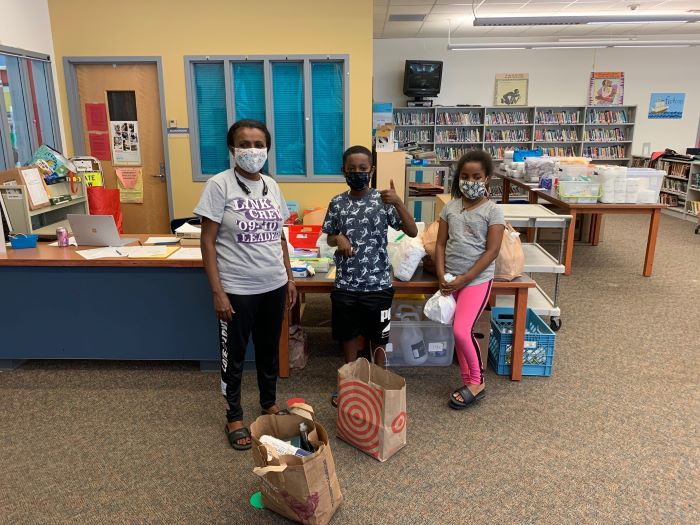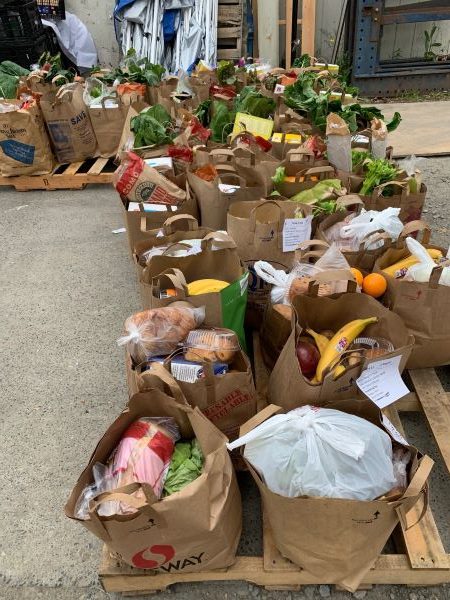
When the economic and social impacts of the coronavirus pandemic began taking root in early spring 2020, the team at Seattle Children’s Odessa Brown Children’s Clinic (OBCC) immediately anticipated the devastation and hardship it would bring.
“From the start, we recognized that the families we serve were being disproportionally negatively impacted by the virus itself, and its effects,” said Arlesia Bailey, senior director of community health and development at OBCC.
Systemic health and social inequities and a pandemic
OBCC has a rich heritage of serving a diverse community. The clinic first opened in 1970; its namesake is Odessa Brown, a Black woman who fought to bring quality healthcare with dignity to children in Seattle’s Central District neighborhood, at the time a racially and ethnically diverse area.
Although the social and economic makeup of the Central District neighborhood has changed in recent years due to gentrification and rising housing costs, OBCC patient families come from diverse backgrounds, and many have been negatively impacted by the pandemic.
While effects of the pandemic have likely reached nearly every household in the country, Black communities and other communities of color have been much more negatively impacted than other groups.
Due to systemic health, social and racial inequities that have existed for hundreds of years, these groups are far more likely to contract, become seriously ill and die from COVID-19, and to experience job and wage losses. Although the challenges brought about by the pandemic spans many areas, the team at OBCC was uniquely prepared to help meet a variety of needs.
Providing more than just healthcare

OBCC provides more than medical, dental and mental healthcare — the team also works to address the social, economic and environmental roots of illness, which is critical to children’s overall health. Bailey says the team at OBCC has a longstanding history of serving as a safety net to the families they support. “Because we provide more services than immunizations or traditional check-ups, our team is able to pivot and help with other, non-healthcare related areas that have emerged during the pandemic.”
When physical distancing guidance was issued in March, the team began proactively calling to check in with families and perform social and emotional wellness checks over the phone.
Community health advocacy manager Antwanette Lyons says the team’s longstanding relationships with families allowed them to be vulnerable and transparent with the team about some of the challenges they were facing. “The calls began as a way for us to let families know that even though they weren’t always able to come in to the clinic like they had, we were still here and were ready and willing to support them,” Lyons said.
One of the biggest areas of need that cropped up during these calls was food insecurity. “We realized pretty quickly that many families had been receiving quite a bit of their household’s food from take-home food bags that were handed out at schools,” Lyons said. “We knew we couldn’t let those families go hungry; we needed to find a way to support that need.”
To help, OBCC partnered with local food banks, Safeway, the Cliff Avril Family Foundation and other nonprofits to ensure the families who used to rely on the food bags from schools continue to receive the food they needed. In many cases, this includes delivering the food bags to families’ homes.
During March, the team at OBCC helped about 400 families by providing food security, financial resources, hygiene and family support.
Lyons says these deliveries are impactful for recipients and the OBCC team, “When we go out and deliver these bags — which often include diapers, school supplies and other things — we’re not just helping to meet a physical need, but an emotional need too. Many families have cried because they’re so grateful someone’s thinking of them. With all that’s wrong with our world today, we want these kinds of deliveries to be a bright spot.”
One mom, Zenashe, says she was speechless as to how helpful the food deliveries were for her family: “I don’t have words to describe how much these food packages helped me. Thank you so much. I’m a single mom and going shopping with kids is hard, but I have no way to leave them alone at the house. These food deliveries saved us time, money and from having to make a trip to the store.”
During school closures, OBCC supports students by giving out books and doing reading challenges. OBCC also provides word searches, pencils and other school supplies. To deliver these items, the team meets families in the community, at schools or transitional housing, and through home delivery.
Supporting social and emotional needs
With physical distancing guidelines in place to help slow the spread of the virus, the virtual realm has become a primary method of connection and communication. This transition can be especially problematic and difficult for households with limited technological equipment or experience.
The team at OBCC helps families find the technology resources they might need, like connecting the family with a nonprofit that provides laptops or internet services, and by offering new, virtual ways for people to connect.
For example, Bailey says the team has had engagement and success with group classes and sessions on relevant topics, like supporting teens during COVID-19 or strategies for meaningful school-to-home partnerships; they’ve even offered a weekly yoga class led by Dr. Lenna Liu, a provider at OBCC. The clinic shares class info on their Facebook page so anyone can participate, not just patient families.
Some of the group sessions were led by families and community members themselves. “It’s been interesting because our attendance and participation has actually gone up with virtual versions of these classes,” Bailey said.
The road ahead
To help ensure patients continue to receive the care they need and to support the resurgence of patient volumes, OBCC will continue to offer families both virtual and in-person appointments.
“I’m really proud of our team. We quickly stood up our telemedicine services and can offer many of our services virtually. We know access to reliable hardware and data is still a barrier for some of our families and we remain committed to ensuring equitable access,” Bailey said.
The OBCC team is strategizing how to immunize kids for flu season during a pandemic, connecting families with coats and gloves, and sharing seasonal, health-related information during this unique time.
“We know cold weather is coming. Unfortunately, there’s a lot of information and resources that used to be distributed at school, like how to safely heat your home in the winter, that is more challenging to disseminate virtually. So, we’re thinking about how we can get messaging out and let our families know about things like the importance of a flu shot, or how to keep your kids busy and safe if they’re inside all winter,” Lyons said. “This isn’t a new way of us providing care — it just looks a little different.”

